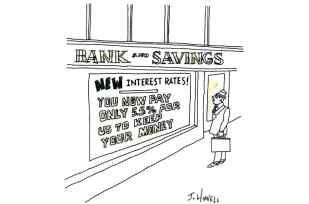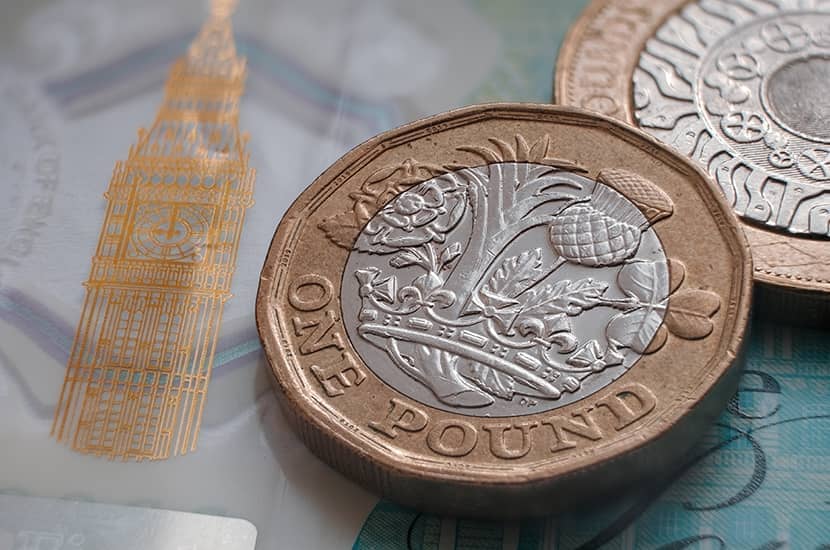‘The main job of a government is to ensure that the economics don’t go wrong.’ So argued an economist friend of mine to me many years back. And I must admit that my first response was uncommonly cynical. ‘Well, you would say that, wouldn’t you?’ I replied. ‘You’re a political economist.’ It is to be expected. In the same way a military-defence type might say that the most vital job of government is to be able to defend these islands and project military force. Or Lulu Lytle might explain that the most important thing in government is to get the interiors right.
But as the years have gone by, I have realised that my cynicism was wrong and my friend’s argument was true. Relatively dull subject though it is, it probably is the primary duty of government to get the economics right. Because when the economics go wrong, everything else goes wrong in very short order.
At the moment the economics seem to be going very wrong indeed. It isn’t just the tax hikes, the inflation and rising cost of living. There is also the old 2008 problem — which is that assuming you do have any money left over, where do you put it? The stock market is falling. Crypto seems to be tanking. You can’t keep money in the bank because inflation eats away at it. Some hereditary part of me still has a preference for hiding any spare cash under the mattress. But many economists advise against this too. Still, I notice that this 2008-style talk is once again every-where. The economics are starting to bite.

This seems to have come as a surprise to many people. Not least to portions of the media that have spent the past two years pretending you can shutter the world’s economies, borrow like crazy and then drive straight off again, like someone switching cars after a crash in Grand Theft Auto. Many alleged specialists argued this, including financial journalists in the mainstream media.
Just last May Forbes magazine could be found suggesting that ‘The inflation scare doesn’t match reality’. In July the Washington Post columnist Helaine Olen maintained that ‘Republicans are scaremonger-ing about inflation to derail the Democratic agenda’. Then the scaremongering turned out to be reality-mongering and the same voices had an explanation for that too. In November MSNBC’s columnist James Surowiecki argued that the inflation we were already seeing was not necessarily bad. MSNBC itself wrote: ‘Why the inflation we’re seeing now is a good thing.’ Almost a shame we don’t have more of it, when you come to think of it.
So long as your standard of living is rising, you can listen to the world’s concerns with a degree of equanimity
I suppose you have to try to put a positive spin on it when the consequences are becoming so clear, and so biting. In the US the average price of a gallon of gas has risen around a dollar in the past year. In parts of California, it is now over $5. President Biden and other leading Democrats are trying to present price increases as a temporary thing. But at no stage do they seem willing to credit that there are any reasons for the economic situation that America, like Britain, has landed herself in.
After all, there must be some consequences from flooding the economy with borrowed money for two years. When President Biden started the process of trying to pump in another few trillion dollars last year as part of a new stimulus bill, he was opposed not only by the Republicans but by two representatives of his own party. The reward of these two moderate Democrats was to be designated by the American left as ‘extremists’ and ‘traitors’. Most Democrats, like most MPs in Westminster, presumed that there was no plausible reason to oppose splurging such cash. Other than the same excuse our age always falls into: if you do not agree with me then you are a racist, sexist bigot who hates the poor.
Why, beyond the obvious effect on our pockets, does this matter? Well, it comes back to my economist friend’s argument — which includes a very basic insight into human nature. I am sure, like me, that when things are on the up you see matters in a different light. Right then it can be hard to sniff the rot. So long as your standard of living is rising, you can watch and listen to the world’s concerns with a degree of equanimity. Other people have things out of proportion, you say to yourself. All will be well, because all is well with you. Bromide abounds.
But the moment that the opposite happens and you feel yourself on the financial slide, then — as some of you will also know — gosh can we get nasty. Once your earnings fall, the value of your assets tumble, you get wiped out, go under water and actually start to run out of the stuff, golly do the demons come out of the cellar. This is when manias begin. Even successful marriages can fall apart. It is the time when we start to wonder if there is anywhere else to turn. The moment when we start to look around for other people to blame.
I wonder, in a way, whether some of our current political obsessions are partly an expression of this. Apart from Jeff Bezos, very few people are better off today than they were this time last year. Most of us have seen and felt a squeeze and we expect it to get tighter in the months to come. In such a situation, it is not merely commonplace but pleasurable to find people to blame. Not least when they are people who deserve it.
Personally, if anyone were sensible enough to install me in power, I would seek to redirect the majority of the blame towards the Chinese Communist party, whose actions started this whole damn thing. But nobody in power in Britain or America wants to do this. In fact all our politicians skipped the CCP blame stage and hopped straight to the ‘Isn’t this the most marvellous opportunity for a reset’ game. I’m not sure that will do. And I’m not certain any mopping-up tactics will last. The cellar door is creaking.







Comments